With a prayer and an apology
Sri Lanka joins the global fight against ivory
trading:
by Dilrukshi Handunnetti
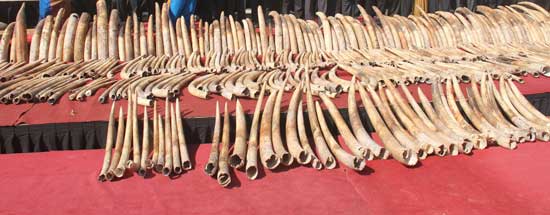 |
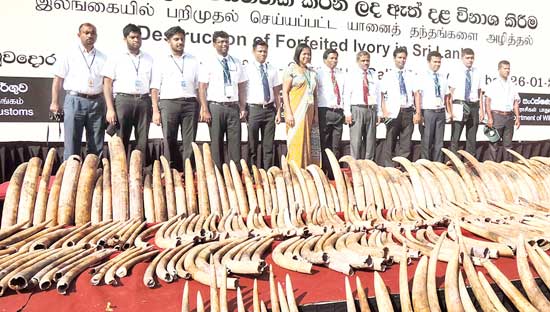 |
|
The team from the
Biodiversity, Cultural and National Heritage Protection Branch
of the Customs.
(Pic Washington Post) |
Conservationists’ slogan apart, by practice, only elephants should
wear ivory, seemed to be the idea behind a special ceremony in Colombo
last Tuesday (26) when a confiscated consignment of ivory was
ceremonially crushed and later burnt.
Even in a world, galvanised into action, ivory trading continues
unabated. It still makes poachers and traders rich and elephants dead.
Sri Lanka became the 16th country to destroy ivory than trade in– by
crushing some 359 tusks weighing 1.5 tonnes at a ceremony attended by a
cross section of the public – in an attempt to apologise to the gentle
giants for the human tyranny in tusk-gathering and join the global fight
against ivory trading.
Ven. Omalpe Sobhitha Thera, who led the religious program at the
simple ceremony at the Galle Face Green told the Sunday Observer, there
was every reason to apologise to elephants for the cruelty shown. “They
alone can wear ivory. Humans have no business trading ivory or
possessing ivory.”
“It is the country’s entire stockpile of ivory,” said Customs
Spokesman, Leslie Gamini.
Estimated to be worth over US$ 3 million, the tusks were were seized
by Sri Lanka Customs in May 2012, en route from Kenya to the United Arab
Emirates, though the tusks came from Tanzania.
The shipment was detained in Colombo following a tip-off from the
Regional Intelligence Liaison Office in Korea. Three containers
consisting of dried sprats were considered suspicious by the authorities
who later led to the discovery of hidden recyclable plastic bags
containing tusks. A scanner detected the tusks, declared as recyclable
plastic, according to Sri Lanka Customs.
Customs officials also said the first response had been to donate the
massive stockpile of tusks to the Temple of the Tooth in Kandy, given
the cultural significance accorded by Buddhists to both elephants and
their tusks. The government at that time was also keen to distribute the
tusks among temples.
However, a possible public outcry reversed an initial plan and the
tusks remained. The new government however, decided to have the stock
destroyed than preserved. Temples too, it is learnt, rejected any
possible ivory donation, due to tusks being collected by killing the
gentle beasts in the African wilds.
“This is unacceptable. Elephants have been killed to cull their
ivory,” Ven. Sobitha Thera said, adding that blood ivory was unwelcome
in Buddhist temples.
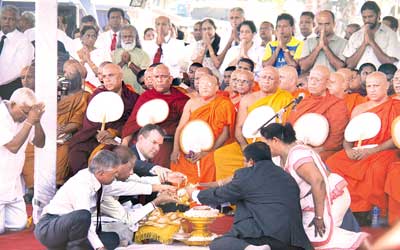 |
| Chanting by the Sangha,
led by Ven. Omalpe Sobitha Thera, to invoke blessings on the
dead elephants |
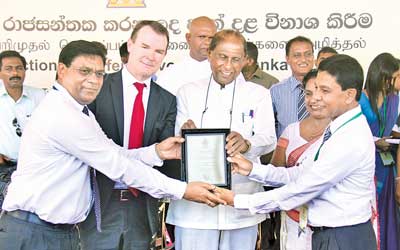 |
| A memento was presented to
former Deputy Director of Customs (Bio diversity Protection
Unit) Samantha Gunasekara by Secretary-General, CITES, John E.
Scanlon and Sustainable Development and Wildlife Minister Gamini
Jayawickrama Perera |
 |
| |
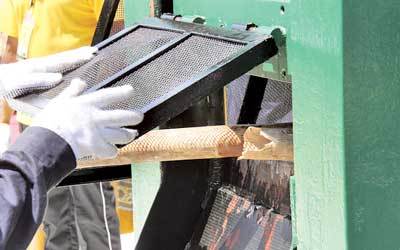 |
| A close view of the
crushing process |
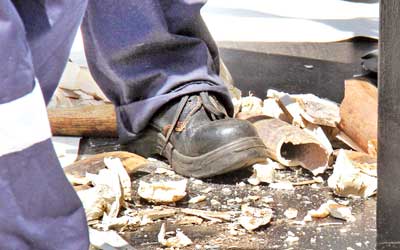 |
| The crushed ivory |
Another fear had been concerns expressed by conservationists about
the possibility of tuskers being sold to third parties who might show
the country in a bad light, as willfully creating conditions for the
violation of the Convention on International Trade in Endangered Species
of Wild Fauna and Flora (CITES), the agency tasked to regulate the
global wildlife trade.
With the crushing of the ivory, Sri Lanka has joined 15 other
countries that took the same path of destroying their ivory in recent
years – Zambia, Belgium, Chad, Gabon, China, the Philippines, United
States, France, Hong Kong, Kenya, Ethiopia, the United Arab Emirates,
Republic of Congo, Mozambique and Thailand.
“The stockpile was publicly destroyed to make it a lesson for all: A
lesson in conservation and non-violence,” said Sustainable Development
and Wildlife Minister, Gamini Jayawickrema Perera. “We are a signatory
to the CITES Convention and wished to comply with State obligations,” he
said.
Bleeding history
The story was a different one when the consignment first reached
Colombo. In a letter dated 19 December 2012, the then Senior Assistant
Secretary to former President Mahinda Rajapaksa, Deepa Liyanage
addressed to the then Director General of Customs Jagath P. Wijeweera,
required the immediate release of the 359 pieces of tusks to the
Presidential Secretariat.
The letter also stated: “His Excellency the President has approved
the release of these 359 pieces of tusks to be used to adorn the walls
of Sri Dalada Maligawa, and the balance to be distributed to other
temples. I shall be thankful if you could kindly get the 359 pieces of
elephant tusks released to the Presidential Secretariat as early as
possible in order to utilise them for the above work. Please note that
the Colombo Logistics will be handling the matters related to the
elephant tusks referred to above on behalf of the Presidential
Secretariat.”
The former Director General of Customs in writing instructed the
Additional Director General of Customs (enforcement) to ‘attend to the
matter urgently” on 24 December 2012.
Due to protests by conservationists and other concerned persons, the
‘tusk distribution’ program was halted. Some of the temples indicated
their unwillingness to accept ivory which had reached the island as a
consequence of elephants being killed for their ivory and hence, going
against Buddhism that promotes non-violence of all forms.
First in South Asia
At the Galle Face green last week, when finally the stockpile of
ivory was crushed, two minutes silence was observed first. Speaking at
the sombre ceremony CITES Secretary-General, John Scanlon, noted:
“Over the past 24 months, we have seen countries within Africa, East
and South East Asia, Europe, the Middle East and North America destroy
stockpiles of illegally traded elephant ivory that has been seized and
confiscated.
“Today’s event is the first destruction of confiscated ivory in South
Asia and it is the first time that such an event has included a
religious ceremony to honour the elephants that were killed, which makes
it a truly unique and remarkable event. This follows the joint
announcement by China and the US last September to enact strong domestic
trade controls that once in effect will represent near total ivory trade
bans. China made its first announcement that it would phase out ivory
trade at the Beijing crush of 662 kg of ivory in May 2015,”
He also said that ending ivory trade and saving elephants from the
brink of extinction continues at a global scale with Sri Lanka having
taken its own place in supporting the battle to conserve elephants and
their ivory.
(Pix by Ranga S. Udugama)
Bullet for brutality
by Dhaneshi Yatawara
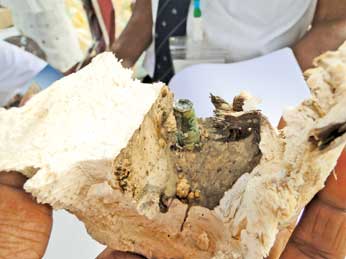 |
|
A tusk with a bullet |
Among the 359 ivory tusks crushed at the Galle Face Green last
Tuesday and prepared for incineration at a factory in Puttlam, was a
bullet that seemed to symbolise the brutality of the ivory trade.
Close to 180 elephants would have been killed, almost all of them
savagely for the 359 tusks, confiscated by the Sri Lanka Customs in May
2012. The lone bullet was discovered among the ashes of the burst tusks.
An incinerator capable of turning the tusks to ash was found only in
the private factory in Puttlam. If not for the private factory, the
government would have been compelled to take the crushed tusks to
Singapore, as it is the closest country with the facility. “The
incinerator needs to reach 2000 degrees centigrade to properly burn the
tusks to ashes,” said Samantha Gunasekara, former Deputy Director of
Customs, explaining the reason for selecting an incinerator owned by a
private company.
Tests done by the Interpol, in an American Forensic lab, revealed the
tusks ere from elephants in Tanzania that had been brutally murdered.
Illegal Wildlife trade is the fourth largest global illegal activity
after drugs, counterfeiting and human trafficking. According to
International Fund for Animal Welfare, the situation is much worst now
as present day poachers are more organised and have better weapons so
that they can, and do kill whole families at a time. |

